by Barbara Slavin
Iraqi President Fouad Massoum said that the government was looking for an independent Sunni Muslim to fill the post of defense minister in an effort to improve chances of reunifying the country and defeating the group that calls itself the Islamic State (IS).
Massoum, in his first extended comments to a US audience since his recent selection as president of Iraq, also said Sept. 26 that Iraqi Kurds—while they might still hold a referendum on independence—would not secede from Iraq at a time of such major peril.
“Today there is no possibility to announce such a state,” Massoum, a Kurd and former prime minister of the Kurdish region, told a packed room at the Council on Foreign Relations in New York. “Forming a Kurdish state is a project, and a project like that has to take into account” the views of regional and other countries and the extraordinary circumstances of the current terrorist menace to Iraq.
Kurdish threats to hold a referendum and declare independence were widely seen as leverage to force the resignation of former Iraqi Prime Minister Nouri al-Maliki. Maliki—also under pressure from President Barack Obama’s administration, Iraqi Sunnis and Iran—stepped down to allow a less polarizing member of his Shia Dawa party, Haider al-Abadi, to take the top job.
Abadi, however, has been unable so far to get parliament to approve his choices for the sensitive posts of defense and interior ministers. Queried about this, Massoum said, “There seems to be some understanding that the minister of defense should be Sunni and there is a search for an independent Sunni.” As for interior minister, Massoum said, they were looking for an “independent Shia” to take the post.
For the time being, Abadi is holding the portfolios, but unlike his predecessor, who retained them, has clearly stated that he does not want to assume those responsibilities for long. Massoum said a decision was likely after the coming Muslim holiday, the Eid al-Adha.
The Iraqi president also said there was progress on a new arrangement for sharing Iraq’s oil revenues, a major source of internal grievances under Maliki. A decision has been made that each of the regions will have representation on a higher oil and gas council, Massoum said. He also expressed confidence in Iraq’s new oil minister, Adel Abdel-Mahdi.
Asked whether Iraq would split into three countries—as Vice President Joe Biden once recommended—Massoum said there might be an eventual move toward a more confederal system but “partitioning Iraq … into three independent states is a bit far-fetched, especially in the current situation.”
Massoum began his remarks with a fascinating explanation of how IS, which he called ISIS, for the Islamic State of Iraq and as-Shams, came into being. He said the group began “as a marriage” between nationalist military officers and religious extremists that took place when they were in prison together while the US still occupied Iraq. The notion of combining Iraq with the Levant—made up of Lebanon, Syria, Palestine and Jordan—is actually an old Arab nationalist concept, Massoum said.
As for the religious aspects of the movement, Massoum traced that to the so-called Hashishin—users of hashish. This Shia group, formed in the late 11th century, challenged the then-Sunni rulers of the day, used suicide attacks and were said to be under the influence of drugs. The English word “assassin” derives from the term.
“Many times these terrorist practices [were used] in the name of a religion or a sect,” Massoum said.
He praised the United States for coming to the aid of Iraqis and Kurds against IS and also expressed support for the recent bombing of IS and Jabhat al-Nusra positions in Syria. But Massoum sidestepped repeated questions about whether such strikes would inadvertently bolster the regime of Syrian President Bashar al-Assad.
“Hitting ISIS in Syria should not mean this is to support the regime or as a beginning to overthrowing Bashar al-Assad,” Massoum said. “That’s why the attacks are limited.”
Asked about Iraqi relations with Iran and whether the Iraqis and Kurds were serving as go-betweens for the United States and Iran in mutual efforts to degrade IS, Massoum noted Iraq’s historic relations with its neighbor and that Iraq also had common interests with the United States.
“We don’t look at America with Iranian eyes and we don’t look at Iran with American eyes,” Massoum said.
He evaded questions about Iran’s military role in Iraq, saying that while he had heard reports that Quds Force chief Qasem Soleimani had visited the Kurdish region, requests for a meeting were not fulfilled. As for Iranian military advisers who were said to have helped liberate the town of Amerli and relieve the siege of Mount Sinjar, Massoum said, there were “many experts” who had come to help the Kurdish peshmerga forces.
Massoum attributed the collapse of the Iraqi army at Mosul to poor leadership, corruption and decades of setbacks starting with Saddam Hussein’s invasion of Iran in 1980. This was followed a decade later by his invasion of Kuwait and subsequent refusal to cooperate with the international community.
“These blows all had an impact on the psychology of the commanders and soldiers,” Massoum said. Iraqi armed forces have gone “from failure to failure.”
The president confirmed that under the new Iraqi government, each governorate will have its own national guard made up of local people. This concept, which may be partly funded by the Saudis and other rich Gulf Arabs, is an attempt to replicate the success of the so-called sons of Iraq by motivating Sunni tribesmen to confront IS as they previously did with al-Qaeda in Iraq.
Asked what would happen to Shia militias—which have committed abuses against Sunnis and helped alienate that population from Baghdad—Massoum said the militias would eventually have to be shut down but only after the IS threat had been eliminated. He did not indicate how long that might take.
Massoum was also asked about reported IS plots against US and French subway systems. Abadi earlier this week made reference to such plots, but US officials said they had no such intelligence. Iraqi officials accompanying Massoum, who spoke on condition that they not be identified, said Abadi had been misinterpreted and was referring only to the types of attacks IS might mount in the West. Massoum warned, however, that “sleeper cells” in the West as well as in Iraq might be planning terrorist attacks.
Asked about Turkey, which has been reticent about aiding Iraq against IS, Massoum, who met at the UN this week with Turkish President Recep Tayyip Erdogan, said he expected more help now that 49 Turkish hostages in Mosul have been freed. Massoum also urged Turkey to do a better job vetting young men who arrive there from Europe and America, and prevent them from reaching border areas and slipping into IS-controlled areas in Syria.

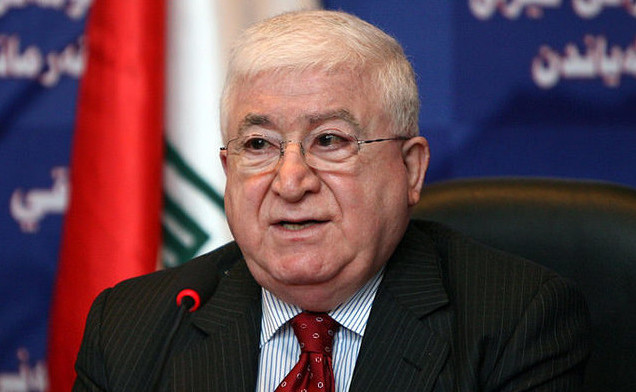
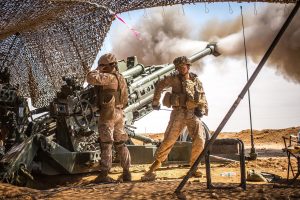
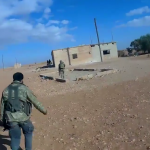
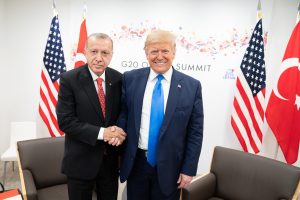
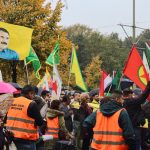
Linking ISIS to the Shia Hashasheen is absurd. The Hashasheen were Ismailis and did NOT use suicide attacks. They assassinated exclusively politicians and generals by using disguises to reach them. They were intelligent and highly educated.
Fouad Massoum sounds like a very uneducated person.
This reflects the common policy now of Khamenei and Obama,, who jointly put Iraq’s Prime Minister Haider al-Abadi in office, to have a government in Baghdad that while primarily representing Sh’ias also give representation to Sunnis.
This is particularly important now so as to win Sunni hearts and minds so they will side with the government and not with ISIS.